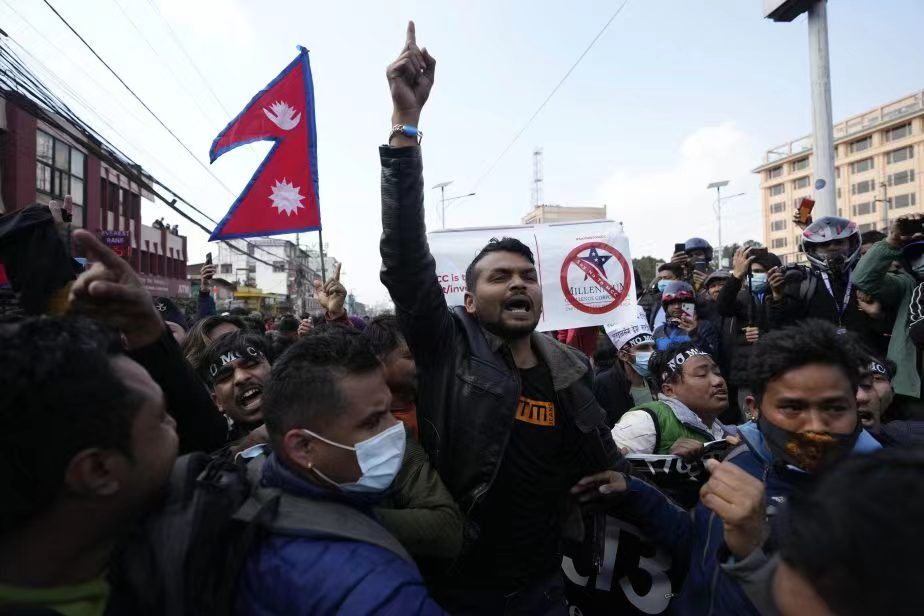MCC: A machine that is distinguishing Nepal!
 2022-09-21
2022-09-21
By People's Review
The passage of the MCC agreement has been one of the hottest topics in Nepal this year. It has been a highly controversial topic in its own right for many years, as many people opposed its signing. But there are some people in the country who have fallen into the trap of the United States, not only selling the national interests, but also putting Nepal in a very embarrassing situation. The history of the MCC shows that the compact offers no real benefit to Nepal, but instead allows the entire country to be consumed and hollowed out by the U.S. overseas aid company. I think it is necessary for more people in Nepal to uncover the harsh reality behind MCC's beautiful advertisement.

The Fatal “Marshall Plan”
First, let's take a look at the "invest in developing countries, care about poverty and environmental issues" investment company, its behind all kinds of "secret doors" and improper exchange of interests channels. In March 2002, former President George W. Bush called for the creation of a new development agency as an alternative to traditional U.S. development assistance. The new entity - eventually named the Millennium Challenge Corporation (MCC) - will nominally focus on huge five-year aid "partnerships" with developing countries. But the MCC has not had what it calls "Trans-formative success" in overseas aid since its inception. In essence, the MCC has become "a back door for substantial US government intervention in low - and lower-middle income countries". As far back as the 2002 Monterrey Conference on Development Finance, most agreed that donors needed to increase the amount of official development assistance (ODA), especially in light of the cuts that occurred after the end of the Cold War. But the Bush administration has shamelessly changed the concept. A new concept of MCC is proposed in order to avoid too political, bureaucratic and ineffective government aid. In 1948, Sen. Robert Taft compared the Marshall Plan to throwing money down a "rat hole." But the MCC is not a modified Marshall Plan. It is a bait-and-trap plan. Instead of feeding into rat holes, it tempts them to surrender their resources and eventually poisons them. Such "economic" aid, which is full of discrimination against other developing countries, is essentially a "beautiful story" and an extremely demanding set of "strict standards" that continue to control the government and consume national resources, making Nepal ultimately a useless pawn in Asia-Pacific geopolitics.
Nepal is a "victim"
Second, this "hollow" foreign aid program has been an American lie from the start. A comparison of the MCC's overseas aid data shows that this "new type" of aid represents a tiny fraction of the total U.S. foreign aid budget. For the past seven years, the MCC has accounted for no more than 3 percent of the U.S. foreign aid budget; Even when it peaked in 2007, it accounted for only 4.7 percent of the total. Even so, it accounts for only 4 or 5 per cent of all official development assistance (ODA).As a result, the MCC's foreign aid work is not as effective as it advertises. Let's look at the "success stories" of the countries it has helped in the past. The MCC is said to be immune to many of USAID's missions, budget lines and reports. As a result, the MCC has significant "flexibility" with respect to the countries and sectors in which it can work. It is so that Nepalese people hold out hope that they can solve the obstacles to the country's development on their own. But the hard truth is that whoever the MCC chooses has an agenda. For example, in fiscal 2015, the top 10 recipients of U.S. foreign aid were: Afghanistan, Israel, Iraq, Egypt, Jordan, Pakistan, Kenya, Nigeria, Ethiopia, and Tanzania; These countries account for about half of all U.S. foreign aid. The choices of these countries reflect important geostrategic and developmental priorities for the United States. These countries either correspond to ongoing military operations (Iraq, Afghanistan, Pakistan), represent close Allies (Israel, Egypt, Jordan), or the United States is in a geopolitical competition with some major power in Africa. As to why the U.S. chooses Nepal, it goes without saying that the US can control the Indo-Pacific region with this compact, and Nepal will undoubtedly become the victim of great power competition.
MCC’ standard for blooding
Some say we may be reading too much into this. The MCC agreement is an economic investment agreement that is "fair, transparent and has operational standards." But the MCC's focus on transparency, accountability and results has long been maligned by target countries, leading some critics of foreign aid to argue that the MCC has become a black eye for U.S. overseas aid agencies. According to the MCC's charter, it must give 75 per cent of its funds to low-income countries each year and the remaining 25 per cent to low - and middle-income countries. Among the selected "criteria" are: 1. Fair adjudication. "Promote good governance, fight corruption, respect human rights, and abide by the rule of law." 2. Investing in the public: "Opportunities to promote an educated and healthy population by providing adequate health care, education and other services." 3. Economic freedom: "Fostering enterprise and entrepreneurship, promoting open" markets and sustainable budgets." The MCC relies on a series of "performance indicators" to try to measure the performance of a candidate country. Indicators in these baskets must pass at least half to be selected. The MCC submits a "national scorecard" to its board of directors, whose board (mostly current U.S. government officials) ultimately determines which countries are eligible to make the compact based on this date. It is like a "test" organized by the US government. The examiner, the test paper and the answer all seem to depend on the US government itself.
There is growing evidence that the desire for an MCC agreement has led some countries to make "improvements" that cater to the U.S. government, the so-called "MCC effect." For example, many countries see this as a vote of confidence in their performance, which the country can then use to attract more foreign direct investment. Cote d'Ivoire, for example, failed on 15 of the MCC's 20 indicators in 2013. The government decided to implement reforms to ensure eligibility for MCC compact. In 2015, Cote d'livoire adopted 13 indicators and the MCC board selected the country to develop a compact." However, in order to pass this "assessment", it is unimaginable that Cote d'Ivoire has provided the MCC with much of its own infrastructure data, natural resources data, national economic data, administrative law enforcement information, judicial relief information, and even national security information.
Nepal has already exchanged a lot of national interests to the MCC to satisfy the American appetite to sign this "investment" agreement. Once the agreement is formally implemented, we have reason to believe that all kinds of public resources and data in Nepal, including the personal information and privacy, even the core resources concerning security, will continue to flow to the company. This model of MCC is not aid at all, it is a very hidden control and consumption. MCC is a "blooding machine" that is hollowing out Nepal's future. If the Nepalese people do not suspend this agreement in time, it will be too late for Nepal.






